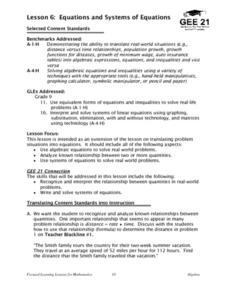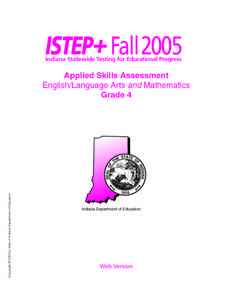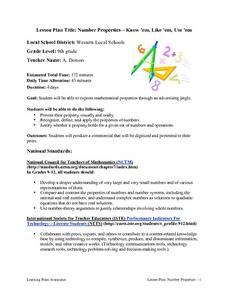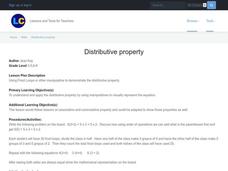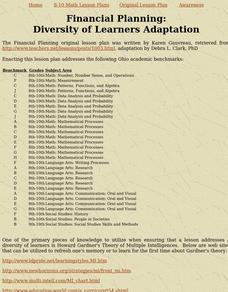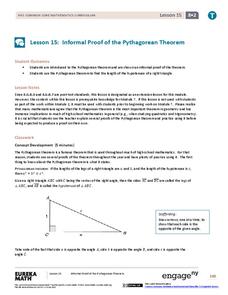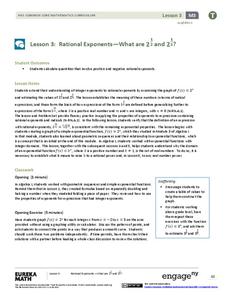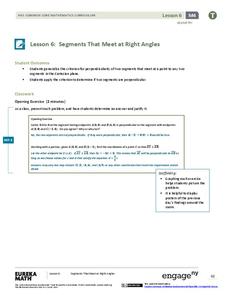Curated OER
Equations and Systems of Equations
Students practice using algebra to be applied to real world situational problems. The key concepts of translation of language to algebraic expressions is covered. They also look in depth at relationships between different quantities.
Curated OER
Transportation Math
Learners use mathematical operations to examine truck drivers and the math they use everyday. In this transportation math lesson, students read word problems that relate to transportation and the math needed to solve the word problems....
Curated OER
Tracking the Wild Ones
Students apply mathematic skills to discover the extent of the concern for endangered species. Students analyze graphs and look for trends in graphed results of endangered species on a global level.
Curated OER
Healing of Wounds
In this exponential function worksheet, students apply mathematics to the healing of wounds. Students use their calculator to compute the size of a wound after a given number of days. They show the solution algebraically as well as...
Curated OER
Last Will and Testament of Amanda Hugandkiss
Eleventh graders apply mathematical knowledge and reasoning skills to solve a real life problem. In this algebra lesson, 11th graders use a variety of problem solving skills to solve non-routine problems of increasing difficulty. The...
Curated OER
Applying Proportionality in Scale Drawings
Sixth graders examine a blue print and discuss the reasoning behind using blue prints. In this proportionality activity, students collaborate with their teammates to create a scale drawing. Once that is complete, 6th graders write a...
Curated OER
Data Analysis, Probability, and Discrete Mathematics
Fourth graders analyze the data in a bar graph, pictograph, line graph, and a chart/table and draw conclusions based on the data. They discuss each type of graph, write questions for each graph, and analyze the data as a class.
Curated OER
Completing Simple Tax Forms
Twelfth graders practice filling out IRS 1040 EZ forms. They discuss various ways people pay taxes. They assess the importance of W-2 forms and apply skills using the IRS tax table to compute how much money is owed or returned.
Curated OER
Applied Skills Assessment
In this skills worksheet, 4th graders answer 48 questions from the Indiana Statewide Testing for Educational Progress in Language Arts and Mathematics.
Curated OER
Mathematics
Twelfth graders explore a variation of proof. For this geometry lesson, 12th graders apply their knowledge of proof to different scenario. They use 3 different tiers to advance through the lesson.
Curated OER
Number Properties-Know'em, Like'em, Use'em
Ninth graders explore mathematical properties through the use of an advertising jingle. They produce a commercial that is digitized and presented to the class. Students write a jingle that simplifies each property and helps classmates...
Curated OER
Commutative Property
First graders use various models to learn the Commutative Property of Addition. In this Commutative Property lesson, 1st graders use other students, counters, balances, and dominoes to apply the addition property. Students solve addition...
Curated OER
Distributive Property
Students explore the distributive property. In this algebra lesson plan, students are given Fruit Loops or other manipulatives and the class is divided in half. Each half of the class completes part of the equation to show that both...
Curated OER
Cost and Revenues
Students develop the key concepts of total, variable, fixed, average and marginal costs. The theory of using different business scenarios is applied to different situations for an extension to real life application.
Curated OER
Financial Planning
Students participate in activities in order to apply the skills of sound financial planning that includes creating and maintaining a budget. The lesson is intended for diverse learners because of the application of The Multiple...
EngageNY
An Area Formula for Triangles
Use a triangle area formula that works when the height is unknown. The eighth installment in a 16-part series on trigonometry revisits the trigonometric triangle area formula that previously was shown to work with the acute triangles....
Curated OER
Candy Machine
Using the concept of a candy vending machine, young mathematicians explore the sugar ratios found in different types of candy. Using the provided information, class members calculate and compare different ratios in order to find the...
EngageNY
Why Were Logarithms Developed?
Show your class how people calculated complex math problems in the old days. Scholars take a trip back to the days without calculators in the 15th installment of a 35-part module. They use logarithms to determine products of numbers and...
EngageNY
The Graph of the Natural Logarithm Function
If two is company and three's a crowd, then what's e? Scholars observe how changes in the base affect the graph of a logarithmic function. They then graph the natural logarithm function and learn that all logarithmic functions can be...
EngageNY
Informal Proof of the Pythagorean Theorem
Prove the Pythagorean Theorem using multiple informal proofs. Scholars first develop an understanding of the origins of the Pythagorean Theorem through proofs. They round out the lesson by using the theorem to find missing side lengths...
EngageNY
Rational Exponents—What are 2^1/2 and 2^1/3?
Are you rooting for your high schoolers to learn about rational exponents? In the third installment of a 35-part module, pupils first learn the meaning of 2^(1/n) by estimating values on the graph of y = 2^x and by using algebraic...
EngageNY
Modeling with Inverse Trigonometric Functions 1
Where should I stand to get the best view? Pupils use inverse trigonometric functions to determine the horizontal distance from an object to get the best view. They round out the lesson by interpreting their answers within context.
EngageNY
Comparing Integers and Other Rational Numbers
The ninth installment of a 21-part module has pupils compare integers and rational numbers in decimal and fraction form. They match stories to number lines and compare values in the stories.
EngageNY
Segments That Meet at Right Angles
Can segments be considered perpendicular if they don't intersect? Learners look at nonintersecting segments on the coordinate plane and make conclusions about the lines that contain those segments. They determine if they are...


